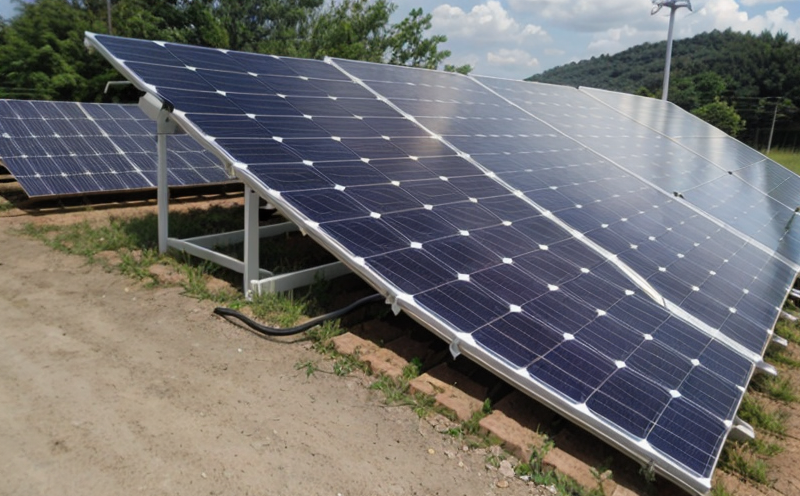UL 9540A Thermal Runaway Propagation Testing
The UL 9540A standard is a critical requirement in the photovoltaic (PV) industry, designed to prevent fires caused by thermal runaway propagation within solar panels and photovoltaic modules. This testing ensures that PV systems are safe under various operating conditions, thereby protecting installations from potential hazards.
Thermal runaway occurs when heat generated during operation is not adequately dissipated or controlled, leading to a rapid increase in temperature that can result in fire risk. UL 9540A addresses this issue by subjecting PV modules and their components to high-temperature conditions to simulate real-world stressors. The test evaluates the ability of the module’s materials to withstand these stresses without causing a thermal runaway event.
The testing process involves several steps, each designed to assess different aspects of the module's performance under thermal stress:
- Initial temperature measurement
- Application of heat source (e.g., infrared lamp)
- Maintenance of controlled temperature conditions for a specified duration
- Monitoring and recording temperature changes throughout the test
- Evaluation of module integrity post-test
The instrumentation used in this testing ensures precise control over environmental parameters, which includes maintaining stable temperatures to within ±1°C. This level of precision is essential for accurate assessment of the thermal stability of PV modules.
Compliance with UL 9540A is mandatory for manufacturers and suppliers of solar panels and photovoltaic components. Failure to meet these standards can lead to recalls, product rejections, and potential legal issues. To avoid such complications, it is crucial for companies involved in the renewable energy sector to ensure their products undergo rigorous testing.
The UL 9540A standard covers a wide range of photovoltaic materials and structures, including monocrystalline silicon (c-Si), polycrystalline silicon (p-Si), thin-film modules, and bifacial panels. By adhering to this standard, manufacturers can demonstrate their commitment to safety and reliability in the renewable energy industry.
| Applied Standards | Description |
|---|---|
| UL 9540A | Mandates testing for thermal runaway propagation in PV modules |
| IEC 61215 | Provides additional guidelines on module performance and reliability |
The UL 9540A standard is particularly important given the increasing global demand for renewable energy. By ensuring compliance with this standard, manufacturers can contribute to a safer and more reliable solar power infrastructure.
In summary, UL 9540A testing plays a pivotal role in safeguarding PV systems against fire risks associated with thermal runaway. This testing not only enhances consumer confidence but also supports the broader goals of sustainable energy production.
Applied Standards
| Standard | Description |
|---|---|
| UL 9540A | Mandates testing for thermal runaway propagation in PV modules |
| IEC 61215 | Provides additional guidelines on module performance and reliability |
Customer Impact and Satisfaction
Compliance with the UL 9540A standard significantly enhances customer satisfaction by providing assurance of product safety. This is particularly important for companies operating in competitive markets where brand reputation and consumer trust are paramount.
The testing process not only ensures that products meet regulatory requirements but also demonstrates a commitment to quality and safety. By adhering to these standards, manufacturers can build long-term relationships with their customers, fostering loyalty and repeat business.
Moreover, the results of UL 9540A testing provide valuable insights into potential areas for improvement. This information can be used by R&D teams to enhance product design and performance, further enhancing customer satisfaction.
Environmental and Sustainability Contributions
- Promotes the use of renewable energy sources
- Reduces the risk of fire-related incidents in solar installations
- Supports sustainable manufacturing practices by ensuring product safety
The UL 9540A standard plays a crucial role in promoting environmental sustainability by reducing the risk of fire incidents, which can have significant negative impacts on ecosystems. By preventing fires, this testing contributes to the overall health and well-being of natural environments.
Furthermore, compliance with these standards encourages sustainable manufacturing practices, leading to reduced waste and improved resource efficiency. This aligns with broader corporate social responsibility initiatives aimed at minimizing environmental impact.





